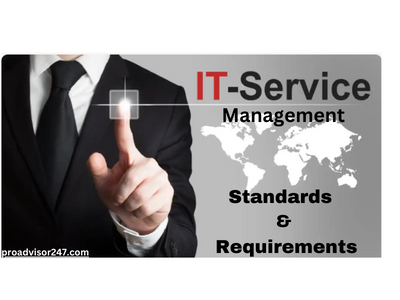
An effective Service Management System (SMS) must be established, implemented, and maintained in accordance with ISO/IEC 20000-1:2018, a widely accepted standard. By coordinating IT services with business goals and client demands, this complete framework is intended to assist enterprises in improving the effectiveness and quality of their IT offerings.
It promotes a culture of excellence in service management by outlining best practices for service delivery, ongoing improvement, and risk management. For businesses looking to guarantee the dependability, consistency, and customer satisfaction of their IT services—and ultimately to boost their competitiveness and success in the rapidly changing world of technology-driven business—ISO/IEC 20000-1:2018 offers as a blueprint.
Company Background
Any company delivers IT management, support, outsourced IT services, and Cloud solutions to medium and large-sized organizations across the world. The company uses ISO/IEC 20000:2018 IT Service Management certification to demonstrate to its new and current clients that it can deliver to the standards promised, supporting its growth ambitions.
To know how VSM Can Optimize the Software Delivery Process, CLICK HERE
Increased Credibility, Especially For Suppliers
- ISO 20000 certification gave any organization a level of credibility that they would otherwise be
unable to achieve. - ISO 20000-1:2018 is an international standard in Service Management, therefore it’s recognized around the world and proves that the certified business co-operates with best practices and that its Service Management
The system is fully compliant.
Increased Customer Confidence
- With the increased credibility, customer confidence grew.
- Customers know that services are managed effectively and that the supplier organization is compliant with international standards.
- Customers are now confident that their services are being handled professionally and optimally.
Incident and Outage Reduction
- Organizations that are ISO 20000-1:2018 certified often find that they can reduce their major outages and IT incidents.
- By following clearly defined requirements and knowing how to apply best practices to their own service management lifecycle, organizations have a better chance of delivering the value that their customers
expect.
Increased Organizational Growth
- With ISO 20000-1:2018 certification, the organization grew more quickly. As the organization’s portfolio changed, and took more services, the “structural elements” were already in place to handle these.
- The certification offered standardized practices, which helped the organization to reduce the risk of knowledge loss when staff leave.
- The organization also employed ISO 20000-1 qualified individuals to reduce the level of training required to onboard new resources.
Proactive Service Management
- Following the reduction in incidents and business outages, the organization became more adept at service management.
- It offered a more proactive service management experience to its customers as ISO 20000-1:2018 certification is all about delivering value to customers.
- To keep customers happy, service management needs a shift from traditional incident management – fixing something that’s reported as broken – to fixing that something before it has a chance to adversely impact the customer.
Reduction Of Costs
- Proactive service management helped to avoid recurring issues and human errors which made the processes run more smoothly.
- Along with the reduction in incidents, less money was spent on support costs, and less was lost through business outages as they became less frequent (or perhaps avoided altogether).
Also, learn more about What Is Intelligent Automation & An Executive’s Guide.
Continual Improvement And Improved CSAT
- Certification helped the organization to implement a culture of change and continual improvement.
- As an organization, It worked to keep up with the best practices of Service Management.
- Improvements were showcased to the clients which resulted in improved CSAT results by approximately 9%.
Service Availability Management
- Service availability can be expressed as a ratio or percentage of the time that the service or service component is actually available for use compared to the agreed time.
- Any unplanned nonavailability of services or service components should be investigated and necessary action be taken.
Service Continuity Management
- It is the capability to deliver a service without interruption, or with consistent availability as agreed.
- The purpose of the Service Continuity Management practice is to ensure that the availability and performance of a service are maintained at sufficient levels in case of a disaster.
- At planned intervals, the risks to service continuity shall be assessed and documented.
Information Security Management
An Information Security Management system (ISMS) is a framework of policies and controls that manage security and risks systematically.
ISO 20000:2018 8.7.3 covers –
• Information security policy
• Information security controls
• Information security incidents
Problem Management
Problem Management is the process of identifying and managing the causes of incidents in an IT service. According to ISO 20000:2018 8.6.3, problems should be:
a) recorded and classified
b) prioritized
c) escalated if needed
d) resolved if possible
e) closed
The effectiveness of problem resolution should be monitored, reviewed, and reported, at planned intervals.
New Requirements In ISO 20000:2018 Revision
• Context of the organization (clause 4)
• Actions to address risks and opportunities (clause 6.1)
• Service portfolio (clause 8.2)
• Asset management (clause 8.2.5)
•Supply and demand (clause 8.4)
Requirements That Are Gone From ISO 20000:2011
• CMDB (Configuration Management Data Base)
• Documented capacity plan
• Documented availability plan
• Delivery policy
• Continual improvement policy
Finally, adopting ISO/IEC 20000-1:2018 in service management is a wise strategic move that has several advantages. An organization’s legitimacy and consumer confidence are both increased by this worldwide standard, which also results in a decrease in incidents and outages. By offering established procedures and encouraging proactive service management, ISO 20000-1:2018 promotes organizational growth.
It also promotes continuous improvement, which raises customer satisfaction, and drives cost savings through streamlined operations. This standard continues to be an invaluable guide for contemporary enterprises, enabling them to succeed in the constantly changing world of IT services by placing a focus on factors like service availability, continuity, information security, and problem management.


